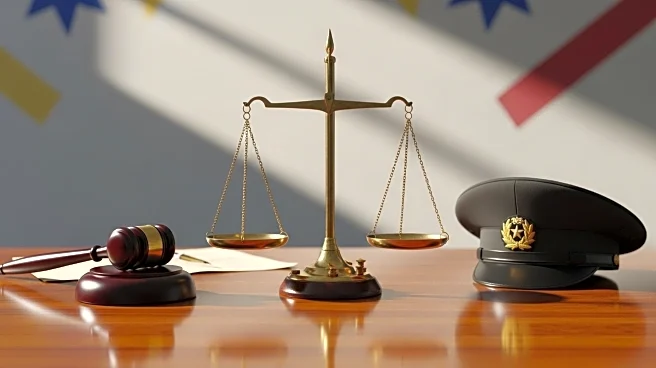What's Happening?
The Defense Department is preparing to authorize up to 600 military attorneys to serve as temporary immigration judges. This initiative, confirmed by Chief Pentagon spokesman Sean Parnell, is in response to a request from the Justice Department to address the significant backlog of over 3.4 million cases in immigration courts. The plan involves Judge Advocate General Corps officers, who typically provide legal support to military personnel, stepping into roles traditionally filled by Justice Department lawyers with extensive immigration law experience. This move follows the Trump administration's recent decision to relax the qualifications for temporary immigration judges, allowing a broader range of government lawyers to preside over immigration hearings. The American Immigration Lawyers Association has criticized the plan, arguing that military attorneys lack the specialized knowledge required for immigration law, likening it to a cardiologist performing a hip replacement.
Why It's Important?
This development is significant as it highlights the ongoing challenges within the U.S. immigration system, particularly the overwhelming backlog of cases. By deploying military attorneys as temporary judges, the government aims to expedite the processing of immigration cases. However, this approach has raised concerns about the adequacy of legal expertise and the potential impact on due process. Critics argue that the integrity of the immigration court system could be compromised, potentially affecting the fairness of decisions made in these courts. The move also underscores the broader policy shifts under the Trump administration regarding immigration enforcement and judicial processes.
What's Next?
If the plan proceeds, the Justice Department will finance the operation, including a six-week training program for the military attorneys in immigration law and procedures. Each attorney must pass a written exam before assuming their role as a judge. The proposal by Florida Governor Ron DeSantis to use National Guard troops as immigration judges could set a precedent for other states, potentially leading to further integration of military personnel into civilian judicial roles. The outcome of this initiative may prompt congressional oversight and debates on the separation of military and civilian judicial functions.
Beyond the Headlines
The use of military attorneys in civilian judicial roles raises ethical and legal questions about the separation of powers and the appropriate use of military resources. It also reflects broader trends in the militarization of domestic policy areas, which could have long-term implications for civil-military relations and the independence of the judiciary.








